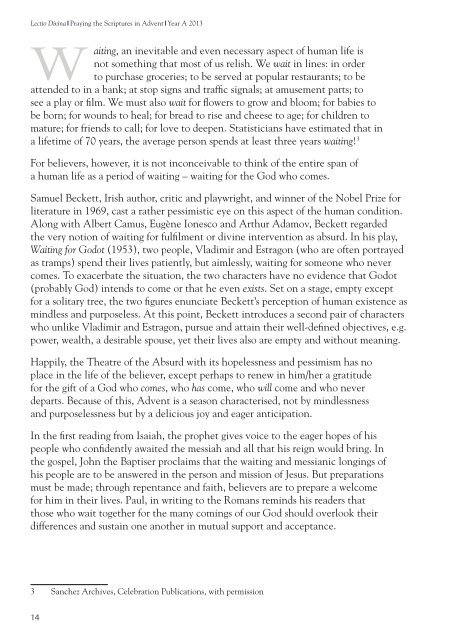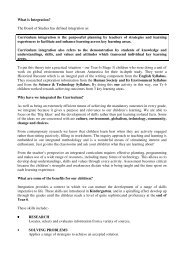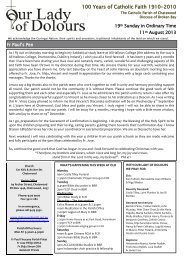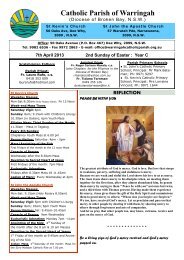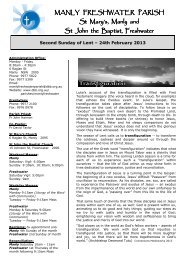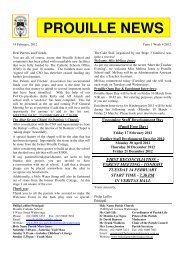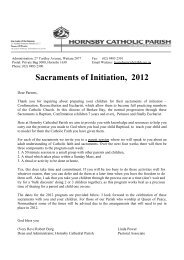lEcTIO dIvINa - Diocese of Broken Bay
lEcTIO dIvINa - Diocese of Broken Bay
lEcTIO dIvINa - Diocese of Broken Bay
Create successful ePaper yourself
Turn your PDF publications into a flip-book with our unique Google optimized e-Paper software.
Lectio Divina Praying the Scriptures in Advent Year A 2013<br />
Waiting, an inevitable and even necessary aspect <strong>of</strong> human life is<br />
not something that most <strong>of</strong> us relish. We wait in lines: in order<br />
to purchase groceries; to be served at popular restaurants; to be<br />
attended to in a bank; at stop signs and traffic signals; at amusement parts; to<br />
see a play or film. We must also wait for flowers to grow and bloom; for babies to<br />
be born; for wounds to heal; for bread to rise and cheese to age; for children to<br />
mature; for friends to call; for love to deepen. Statisticians have estimated that in<br />
a lifetime <strong>of</strong> 70 years, the average person spends at least three years waiting! 3<br />
For believers, however, it is not inconceivable to think <strong>of</strong> the entire span <strong>of</strong><br />
a human life as a period <strong>of</strong> waiting – waiting for the God who comes.<br />
Samuel Beckett, Irish author, critic and playwright, and winner <strong>of</strong> the Nobel Prize for<br />
literature in 1969, cast a rather pessimistic eye on this aspect <strong>of</strong> the human condition.<br />
Along with Albert Camus, Eugène Ionesco and Arthur Adamov, Beckett regarded<br />
the very notion <strong>of</strong> waiting for fulfilment or divine intervention as absurd. In his play,<br />
Waiting for Godot (1953), two people, Vladimir and Estragon (who are <strong>of</strong>ten portrayed<br />
as tramps) spend their lives patiently, but aimlessly, waiting for someone who never<br />
comes. To exacerbate the situation, the two characters have no evidence that Godot<br />
(probably God) intends to come or that he even exists. Set on a stage, empty except<br />
for a solitary tree, the two figures enunciate Beckett’s perception <strong>of</strong> human existence as<br />
mindless and purposeless. At this point, Beckett introduces a second pair <strong>of</strong> characters<br />
who unlike Vladimir and Estragon, pursue and attain their well-defined objectives, e.g.<br />
power, wealth, a desirable spouse, yet their lives also are empty and without meaning.<br />
Happily, the Theatre <strong>of</strong> the Absurd with its hopelessness and pessimism has no<br />
place in the life <strong>of</strong> the believer, except perhaps to renew in him/her a gratitude<br />
for the gift <strong>of</strong> a God who comes, who has come, who will come and who never<br />
departs. Because <strong>of</strong> this, Advent is a season characterised, not by mindlessness<br />
and purposelessness but by a delicious joy and eager anticipation.<br />
In the first reading from Isaiah, the prophet gives voice to the eager hopes <strong>of</strong> his<br />
people who confidently awaited the messiah and all that his reign would bring. In<br />
the gospel, John the Baptiser proclaims that the waiting and messianic longings <strong>of</strong><br />
his people are to be answered in the person and mission <strong>of</strong> Jesus. But preparations<br />
must be made; through repentance and faith, believers are to prepare a welcome<br />
for him in their lives. Paul, in writing to the Romans reminds his readers that<br />
those who wait together for the many comings <strong>of</strong> our God should overlook their<br />
differences and sustain one another in mutual support and acceptance.<br />
3 Sanchez Archives, Celebration Publications, with permission<br />
14


